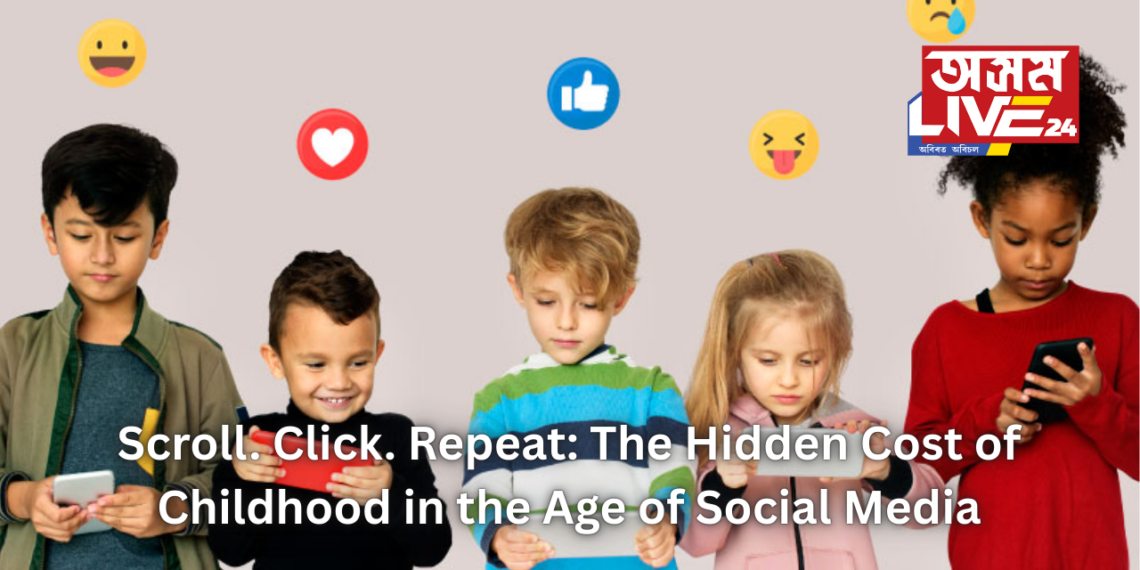Social media platforms offer many positive uses like learning, news consumption, communication, positive inspiration, receiving emails, entertainment, official work, and even as a source of income. But at the same time, some people are using it just to loot money and create fake impressions—and the sad part is, many of us are getting impressed by such things day by day.
Despite these good sides, there is a growing concern: today’s generation of children is becoming addicted to social media platforms like Instagram, Snapchat, YouTube, TikTok, and more. According to a UK study in 2024, almost 75% of children use at least one social media app, and 50–60% are already exposed to it on a regular basis. In India, a recent study shows that an average child under the age of 5 spends around 2.2 hours daily in front of a screen.
These platforms are filled with interesting content that keeps children hooked. Now, with Artificial Intelligence adding more spice to the content, it has become even more attention-grabbing and addictive. This leads to a dopamine cycle—where the brain keeps craving more quick pleasures, making it difficult for children to focus or disconnect.
As a result, children are paying a hidden cost: many suffer from mental health issues like anxiety, low self-esteem, and a lack of confidence. Their communication skills are weakening. They become easily irritated and burst into anger over the smallest things, as if patience is no longer part of their nature.
They spend more time with screens than with their parents or grandparents. That golden time—when grandchildren used to play with their grandparents and learn about their culture, traditions, and ancestral stories—is slowly disappearing.
Children are also becoming socially isolated. They lack physical activities and real-life experiences, which affects their academics and leads to poor performance in studies. They are exposed to unrealistic beauty standards, harmful trends, vulgar content, and inappropriate behavior. Social media algorithms do not detect user age properly, so anything can appear on a child’s screen.
Recently, “ I came across a shocking video where some minor children were filming themselves lying on a railway track under a running train. It’s also become common to see people—especially in Assam—posting videos using highly vulgar and abusive language. Sadly, many children watch and imitate them, thinking it’s normal “ said a user .
Some children also become addicted to mobile games, which adds to the problem. Parents play a significant role in this. Many are themselves constantly engaged with their phones around their children. Often, when a child refuses to eat or becomes upset, parents hand over their phones to calm them down with the distraction of a colorful screen—without realizing how harmful this habit can be.
A concerning trend today is parents recording and uploading their children’s activities on social media. This not only exposes children at a very young age but also increases their engagement and dependency on digital platforms.
Parents must take responsibility by setting limits on their children’s screen time, allowing them to use devices only for a limited period. They should filter content to ensure it is educational and age-appropriate. Most importantly, they should make children aware of the dangers of social media addiction and encourage them to participate in real-life activities and social interactions.
Schools and teachers also have a crucial role to play. It should be a part of early education to teach children about digital hygiene and the responsible use of social media. Enforcing age restrictions, improving content moderation, and raising awareness are necessary steps to protect the younger generation from the hidden dangers of the digital world.
So, we are risking the growth of an entire generation—and the consequences could be deeply damaging if more children continue to fall into this trap. Now is the time to reclaim childhood from the scroll-shaped cage that slowly steals their innocence and wonder.
Parents must rise above their busy schedules and truly engage with their children—talk to them, spend quality time, involve them in real-life tasks, and encourage physical activities that help improve their communication and language skills. It’s also essential to teach them to take pride in their own language, culture, and roots.
Children should grow up loving real-world connections, not hiding beneath mobile screens. This is how they will learn their true worth—not from likes or followers, but from meaningful relationships, identity, and human experience.
এনেধৰণৰ অন্যান্য বা-বাতৰিৰ বাবে লাইক কৰক অসম লাইভ ২৪ ৰ ফেচবুক পেজ




















